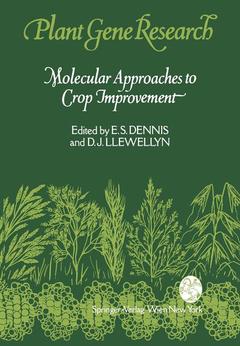Molecular Approaches to Crop Improvement, Softcover reprint of the original 1st ed. 1991 Plant Gene Research Series
Langue : Anglais
Coordonnateurs : Dennis Elizabeth S., Llewellyn Danny J.

Although plant genes were first isolated only some twelve years ago and transfer of foreign DNA into tobacco cells first demonstrated some eight years ago, the application and extension of biotechnology to agricultural problems has already led to the field-testing of genetically modified crop plants. The promise of tailor-made plants containing resistance to pests or diseases as well as many other desirable characteristics has led to the almost compulsory incorporation of molecular biology into the research programs of chemical and seed companies as well as Governmental agricultural agencies. With the routine transformation of rice and the early evidence of transformation of maize the possibility of the world's major cereal crops being modified for improved nutritional value or resistance characteristics is now likely in the next few years. The increasing number of cloned plant genes and the increasing sophistication of our knowledge of the major developmental and biochemi cal pathways in plants should eventually allow us to engineer crop plants with higher yields and with less detrimental impact on the environment than now occurs in our current high input agricultural systems. This book draws together many of the expanding areas of plant molecular biology and genetic engineering that will make a substantial contribution to the development of the more productive and efficient crop plants that the world's farmers will be planting in the next decade.
1 Transgenic Rice Plants.- I. Introduction.- II. Rice Protoplast Culture.- III. Gene Transfer in Rice.- IV. Integration of Foreign DNA into Rice Chromosomes and Its Transmission to Progeny.- V. Co-transformation as a Simple Method to Introduce Non-selectable Genes.- VI. Expression of Foreign Genes in Transgenic Rice Plants.- VII. Discussion.- VIII. References.- 2 Genetic Transformation of Potato to Enhance Nutritional Value and Confer Disease Resistance.- I. Introduction.- II. Nutritional Improvement.- III. Enhancing Disease Resistance in Plants.- IV. Conclusions.- V. References.- 3 Improvement of the Protein Quality of Seeds by Genetic Engineering.- I. Introduction.- II. Background.- III. Factors To Be Considered Before Modifying Seed Proteins.- IV. Strategies for Improving Seed Proteins.- V. Prospects for the Future.- VI. References.- 4 Novel Insect Resistance Using Protease Inhibitor Genes.- I. Introduction.- II. Bacterial Toxins.- III. Protease Inhibitors.- IV. Protease Inhibitors as Protective Agents.- V. Engineering for Resistance Using Cowpea Protease Inhibitor Genes.- VI. References.- 5 Engineering Microbial Herbicide Detoxification Genes in Higher Plants.- I. Introduction.- II. Weeds, Agriculture, and Herbicides.- III. Transgenic Herbicide Resistant Crops.- IV. Microbial Degradation of Herbicides.- V. Genetic Engineering of Plants.- VI. Conclusion.- VII. References.- 6 The Manipulation of Plant Gene Expression Using Antisense RNA.- I. Introduction.- II. Examples of the Control of Plant Gene Expression Using Antisense RNA.- III. Technical Questions Unanswered.- IV. Outlook.- V. References.- 7 Molecular Biology of Flavonoid Pigment Biosynthesis in Flowers.- I. Introduction.- II. Flavonoid Pigments.- III. Biosynthesis of Flavonoids.- IV. Conclusion.- V. References.- 8 Molecular Aspects of Self-incompatibility in the Solanaceae.- I. Introduction.- II. Biology and Genetics of Self-incompatibility in the Solanaceae.- III. Molecular Biology of Self-incompatibility.- IV. The Style S-glycoproteins of Nicotiana alata Are Ribonucleases.- V. Function of RNA Degrading Enzymes in Cell—Cell Interactions in Other Systems.- VI. Conclusion.- VII. References.
Date de parution : 01-2012
Ouvrage de 166 p.
17x24.4 cm
Disponible chez l'éditeur (délai d'approvisionnement : 15 jours).
Prix indicatif 105,49 €
Ajouter au panierThèmes de Molecular Approaches to Crop Improvement :
Mots-clés :
© 2024 LAVOISIER S.A.S.


